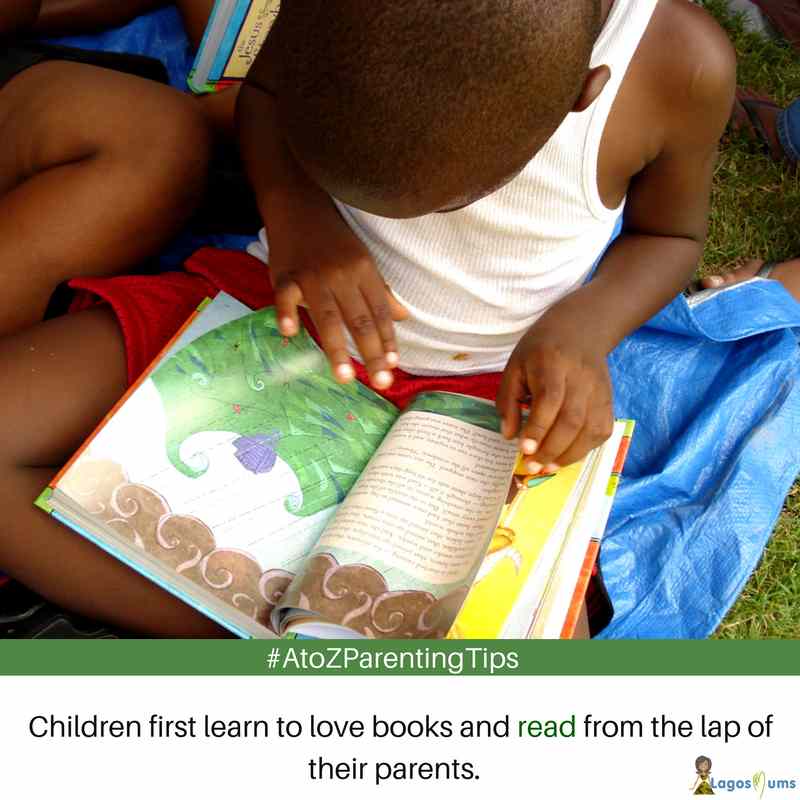Last week in the A to Z Parenting tip series we looked at how to teach our children to ask questions. This week will be taking a look at how to teach your children to imbibe a reading culture.
According to Martha Nwachukwu in the National Mirror Reading has been from time immemorial; right from the era of hand graven writings on caves and walls to writings in papers or scripts. Reading enhances one’s knowledge and broadens one’s horizon in any field or area of interest or doubt. This is absolutely true!
The question now is how do we teach our children to imbibe a reading culture? Children are not definitely like adults – who can by themselves know that their lives depends on it, or not. Children need to be stirred, pampered, encouraged to embark on the journey of loving to read. And as the popular saying goes, Leaders are readers. So how do you then prepare your child to be a leader?

First, Let there be a connection between what your child is reading and real life Situations.
Most children learn by what they see and hear around them on a daily basis. As a parent in the 21st Century, we should learn to take cognizance of the environment our children grow up in. Children are able to relate to things happening around them. Children also appreciate when the things they experience in their culture are shown in vivid examples like a primary school book that shows a child going to the market with her mother. There is a great feeling when a child sees herself in a story she can relate to.
We should find out what our children naturally have interest in
The best way to get a child to build good reading habits is to find out what the child finds interesting. It may surprise us when we sit down and have a good long chat with our children we would find out that they have a lot of things running through their little minds. Take for instance your child has a natural flair for science related things, you could help that child by purchasing elementary science books, enroll them to participate in science fairs, and help your child with science experiments. The more they learn from exploring, the more they will desire to read further. Discover what your child is passionate about and then use his or her interests as natural motivators to increase their reading culture
Give them the free will to choose what they want to read
This should not be in all cases, but sometimes give them this opportunity. Children are naturally empowered to read more anytime they are given the free hand to make their own choices. You could also encourage them to read by taking them to the bookstores and let them select books that naturally catch their fancy.
Encourage them also, to form study groups among their peers, or what is otherwise know as a book club. This could also encourage a high level of serious reading as children most times are competitive in nature.
Encourage your child to set targets for themselves, and give themselves reward for their efforts too
We should encourage our children to set targets for themselves when they are reading. This would take a lot of discipline on their part. Refer to our post teach them discipline. They could start off with a book a month and as they grow we could make it two books a month. Later on we can increase the number of books our children reads within a month, two months, three months and so on…. After this we could encourage them to give themselves little treats or prizes for meeting their reading targets. This would serve as a source of motivation for them if they begin to grow weary of reading. It is often said that it takes 21 days to form a habit, so by using a ‘target reading strategy’ it would be so much easier for your child to imbibe a healthy reading culture.
Monitor your child’s reading culture and reward their efforts
The best way to get a child to undertake a task effectively and efficiently is when they realize they are being carefully monitored while they undertake the task. Now I am not talking about strict monitoring as this may scare the whole idea out of the child (and that wouldn’t get us anywhere in the long run). Rather check ups on the child’s reading progress and constant encouragement with a dose of love and kindness.
Lastly we encourage that you read with your child. When they are younger read to your child and as they get older you can discuss books of interest together with your child. Reading is fun and the best way to explore and learn about the world.



